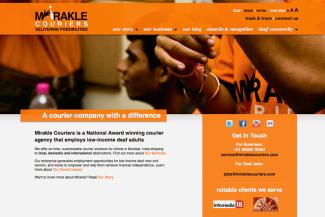Private sector
Unlocking potential

Inflicted by polio at the age of two, Ranjana Ghosh could not walk to school in Gabberai village in West Bengal as it was far away from her home. Moreover, it had no facilities for girls like her. Realising the need to contribute to her family’s livelihood, she enrolled in a machine-knitting programme. At completion, she had a certificate but no means to start earning money. She had neither a knitting machine, nor wool, and there was no money to invest. Selling the products would have been a huge challenge too. All summed up, her newly acquired skills were of little use,
Ranjana is not alone in finding herself helpless after completing a vocational-training programme. India is a home to over 21 million persons with disabilities (PwDs). Between 5 million and 5.5 million are in the age group of 12 to 24 years. Most schools are not designed to accommodate them, and most teachers have not been trained to teach children with special and diverse needs. Accordingly, most children with disabilities remain outside the education system. A sizeable section are poor. Most live in rural areas, as do about 70 % of the Indian population.
In a scenario of limited access to school education, PwDs realise that vocational training is important. They need to acquire skills to find work. However, most vocational training programmes are not designed well. For instance, the state-supported facilities are located in the cities, and most rural people know nothing about them (see box).
Encouraging examples
There is a silver lining however. Some measures are job-oriented from the very beginning. Some initiatives in the context of corporate social responsibility (CSR) focus on supporting PwDs. A handful Indian corporations including the Tata group and the ITC conglomerate and multinational corporations such as IBM and Kentucky Fried Chicken have committed to making their staff more diverse and are training and hiring PwDs accordingly.
Another encouraging example is Mirakle Couriers. This for-profit company is based in Mumbai and trains and employs only hearing and speech impaired persons in its messenger services. Revive Enterprises in Mumbai similarly employs only visually impaired persons, both as frontline and backend staff. The company provides sound, lighting and karaoke systems on a rental basis.
Some companies have even recruited PwDs in senior positions. IBM India engages PwDs in project management, programming, consulting, operations, quality assurance and human resources. ITC employs PwDs in its hotels in core functions like finance and human resources as well as in housekeeping or concierge services. Some public-sector institutions, including the National Thermal Power Corporation and Bharat Heavy Electricals Limited, similarly engage PwDs in various roles.
Industry associations – especially the National Association of Software and Services Companies (NASSCOM) – are also playing a proactive role in promoting skills training and employment, taking advantage of their reach and membership. In 2009, the NASSCOM Foundation came up with its Accessibility Initiative, a rights-based approach for the inclusion of the PwDs in businesses related to information technology (IT).
The Foundation partners with the state-supported vocational resource centres (VRCs) to provide advice to jobseekers with disabilities. Moreover, it conducts regular job faires in Bangalore in collaboration with vocational training institutes run by India’s central government and civil-society organisations. Finally, the NASSCOM Foundation has started a mentoring project to support IT companies in finding qualified employees with disabilities.
Some other initiatives by civil society organisations (see list of links below this essay) are also working on tapping the potential commercial interest of private-sector companies in employing PwDs. Disabled persons, especially the poor, face many uncertainties associated with self-employment. They cannot take business risks. Accordingly, it makes sense to train them in skills that are in labour-market demand. This is actually a two-pronged approach:
- on the one hand, it provides skills geared to the needs of the employers,
- on the other hand, it makes employers aware of the business case for hiring PwDs.
In designing vocational courses, the emphasis is on the growing sectors of hospitality and retail. Key skills include basic computing, conversational English, the fundamentals of accountancy, soft skills to handle clients et cetera. At the same time, corporate-sector managers are informed about what they need to employ PwDs with special needs. To some extent, such efforts have begun to reach out to the youth with disabilities.
Win-win situations
Job opportunities for persons with disabilities are very important. Many families consider their impaired members a burden. If the affected persons find good employment, however, they are often able to pull their families out of poverty.
Another important dimension of active labour-market involvement of PwDs is that employers move on from a patronising charity approach to one driven by business concerns. Indeed, companies benefit from competent staff with disabilities, provided that the persons concerned have skills the companies need. Having a diverse work force that includes PwDs, moreover, serves a company’s public image.
The huge challenge is that there are far too few measures of this sort. All examples mentioned here do not account for even one pe cent of India’s persons with disabilities. The human-resource departments of most corporations have not been convinced of employing PwDs yet. They neither invest in training nor modifying workplaces in a way that would suit persons with special needs.
The share of PwDs in senior managerial positions is minimal, and almost all formal-sector jobs are urban. Given their impaired access to education and very basic levels of skills and vocational training, most of the PwDs who find work are engaged at lower levels. In addition, there is a gender gap. Women tend to be excluded from many industrial training programmes. While there are some successful models, these are typically islands of excellence.
Knowledge society
It is an opportunity that policy makers have recently begun to focus on turning India into a knowledge economy. India has the world’s youngest work force. The median age is much below that of China and OECD countries. It is estimated that half the population of the country will be under 28 years of age even in 2030.
To build on the advantage of a youthful population, India’s previous government, which was led by Manmohan Singh of the Congress Party, had taken up development of skills in a major way. The National Skill Development Mission is supposed to train 500 million youth. The idea is to create a talent pool to contribute to the growth of the domestic economy as well as to reap in a demographic dividend from migrants employed in the world’s ageing nations.
India’s new government under the BJP’s Narendra Modi should continue this programme and explicitely include disabled persons, with earmarked financial allocations. New technology platforms are being developed in the context of the Mission, and they should be designed in a way that allows access to PwDs.
Finally, it is back to the basics – giving children with disabilities access to quality education. India has to invest in inclusive education to ensure that children with disability learn and find gainful employment.
Ipsita Sapra is a sociologist at the Hyderabad campus of the Tata Institute of Social Sciences. Her PhD thesis dealt with young people with disabilities.
ipsita_basu@yahoo.com















